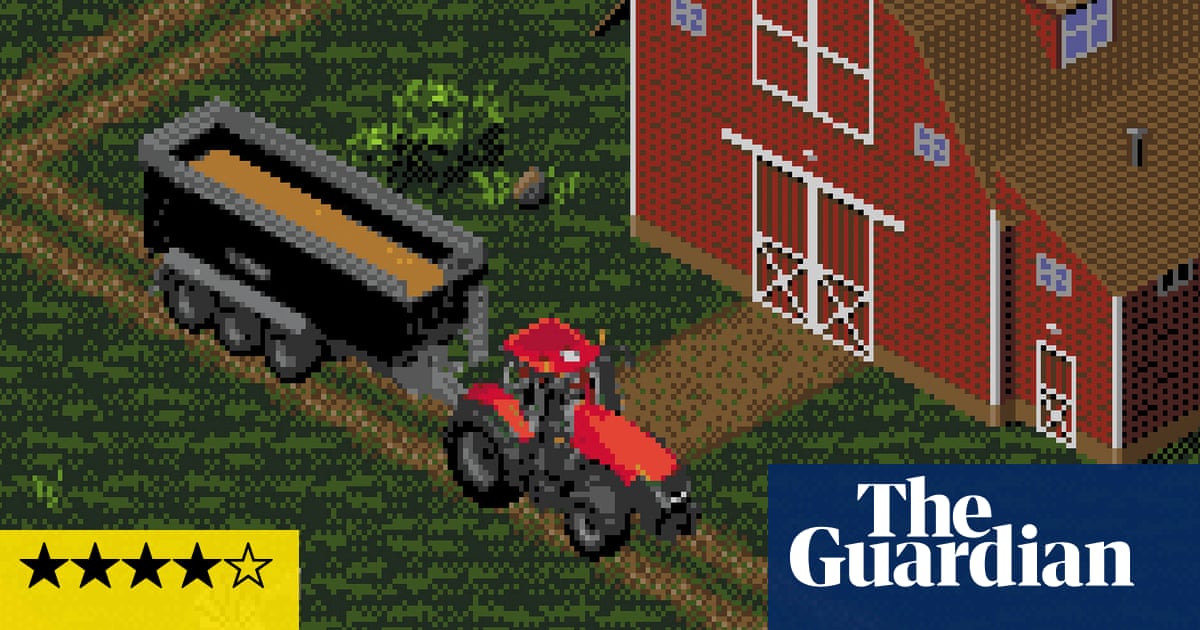When I got my first job in games journalism 30 years ago, I arrived just too late to review games for my favourite ever console: theSegaMega Drive. Although a few titles were still being released for the machine in 1995, the games magazine world had moved on and all anyone wanted to read about were the Sony PlayStation and Sega Saturn. It was a bitter blow.
Fast-forward to 2025 and a resurgent interest in producing new games for vintage home computers and consoles has led to Farming Simulator: 16bit Edition – a Mega Drive instalment in the hugely successful agricultural sim series. The passion project of Renzo Thönen, lead level designer and co-owner of Farming Simulation studio Giants Software, the game has been written using an open-source Mega Drive development kit, and manufactured in a limited run of genuine Mega Drive cartridges. Slotting this brand new release into the cart of my dad’s ancient Mega Drive II console felt ridiculously moving and I thought the game could only be a letdown after that. But I was wrong.
Farming Simulator: 16bit Edition takes the basic rhythms of its stablemates – sowing, harvesting and selling crops – and puts them in an isometric environment where workable fields are interspersed with useful buildings such as fuel depots, seed stores and garages. You begin with basic tractors and harvesters, but as you carefully work the land, you grow and sell wheat to earn money, thereby opening the prospect of upgrading your machinery and buying more powerful vehicles. Eventually, you make enough money to unlock new farm areas, but the basic game play is always the same: you slowly and carefully drive your tractors over your land, ploughing and sowing and harvesting as the seasons pass.
In this reduced format, the sedate pace of the farming simulator games should become a dull repetitive chore; robbed of intricately detailed 3D visuals, real-time weather systems and supplementary activities, all you’re doing is effectively mowing the lawn. Over and over again. Let’s be honest: transferring the complex, multilayered 3D sim into a console that launched at the same time as the world wide web and the first mass manufactured Nokia mobile phone was always going to be a technical challenge.
But somehow, the system still works. Perhaps it’s the nice chug-chug sound effects of the tractors, or the amusingly precarious steering that often sends you crashing into a tree; or maybe it’s the sheer nostalgia of the rugged 2D visuals. I don’t know. I just know that I’ve kept playing. Veteran Mega Drive owners may be reminded of the Desert, Jungle and Urban Strike games or the isometric strategy delights of Populous or General Chaos. But what’s really fascinating is seeing a modern game genre on this old machine and wondering, what score would it have received from contemporary gaming mags such as Sega Power or Mega?
Perhaps, this is one for Mega Drive nuts like me who thrill at the idea of running something new on their beloved artefact – like playing a 4K Blu-ray movie on a Toshiba video recorder. It’s also going to be tough to secure one as only 1,000 are being made. However, Giants has previously released a Commodore 64 version of the game, Farming Simulator C64, which is now available to play for PC, and perhaps an emulated version of this one will also find a way to modern machines.
And yet, like a deluxe half-speed remaster of some old vinyl album, there is emotional value in the format itself. This is why Giants isn’t alone in producing new carts for the old consoles. The excellent puzzle platformer Tanglewood appeared for the Mega Drive a few years ago and a promising shooter Earthion is coming later this year. Limited Run games has also made a whole range of new SNES carts for classic titles.
I wish my dad were around to see me reviewing a new release for the last console we played on together. As someone who spent all his boyhood summers staying on a farm, he certainly would have loved this game. For now, I will keep ploughing these fields and selling wheat, enjoying the tranquil cycle of nature as rendered on a machine as out of date as an ox cart.
Farming Simulator: 16bit Edition is available now, £43
